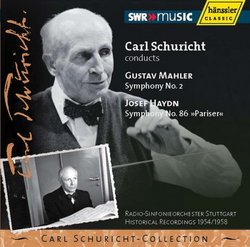Awe-Inspiring "Resurrection"
Johannes Climacus | Beverly, Massachusetts | 10/13/2009
(5 out of 5 stars)
"I have slowly been working my way through Hänssler's superb Schuricht edition (all broadcast performances with the SWR/Stuttgart orchestra taken down in the 1950's through early '60's), and have so far been impressed by the consistently high quality of the performances, the orchestral playing, and the sound (monaural, but surprisingly good).
This account of Mahler's gigantic "Resurrection" Symphony, however, is surely the pick of the litter. It is, in a word, stunning. Schuricht galvanizes the SWR ensemble to play as if their lives depended on it. As one would expect with a provincial band, there are occasional flubs (mostly in the brass) and inconsistencies of tuning, but overall this orchestra responds with tremendous enthusiasm and considerable collective virtuosity to Schuricht's direction. Moreover, that direction is not, as one might have anticipated from some of this conductor's studio recordings, plain to the point of being dour. Far from it. Though as always with Schuricht, impeccable taste is preferred to glamor and rhetorical effect, on this occasion he leads with a passionate conviction that sweeps all before it. Not one facet of Mahler's kaleidoscopic evocation of things earthly, demonic and heavenly is slighted. The first movement is overwhelming in its minatory power; the subsequent Ländler dances lightly and seductively. St. Anthony preaches in appropriately mock-stentorian tones to the fishes, and *Urlicht* envelops one in rapt contemplation. The final apocalyptic movement conveys a sense of inexorable dënoument, as it proceeds toward its refulgent, but never triumphalistic, conclusion. The soloits and chorus acquit themselves admirably, within the somewhat cavernous acoustic of the hall in which this broadcast was taken down. Perhaps only the "trump of doom" sequence and the following march (taken at a rather sedate tempo) struck me as underplayed. Otherwise, this is a truly awe-inspiring recreation of Mahler's visionary score.
As if this were not enough, the second disc concludes with a winsome account of Haydn's delightful Symphony no. 86 (one of the lesser known of the "Paris" group) from another broadcast. Both symphonies are well recorded. In the Mahler the engineers manage to capture sufficient detail, and provide sufficient foucs, despite the expansive soundstage. Strongly recommended to listeners who enjoy "historic" performances (the adjective taken in a broad sense), or to fans of the conductor (of which I am rapidly becoming one). However, those in the market for a first recording of this work should probably choose one of the top studio recordings; my preferences would be for Bernstein/Sony (far more compelling than his later DG account); Solti/Chicago (the spectacular playing and singing will sweep you away); Rattle/EMI (a very different interpretation, more subdued and introspective than most); Klemperer/EMI (tough, vibrant, life-affirming), and Walter (the most uplifting of all, though he slights some of the tragedy in I and some of the irony in III)."


 Track Listings (4) - Disc #1
Track Listings (4) - Disc #1